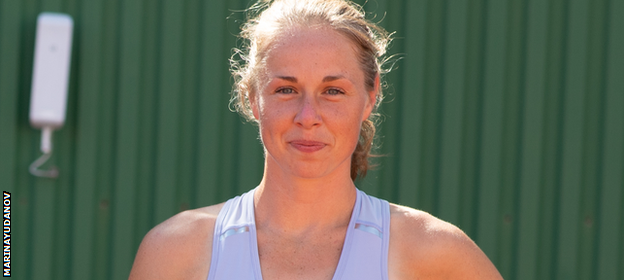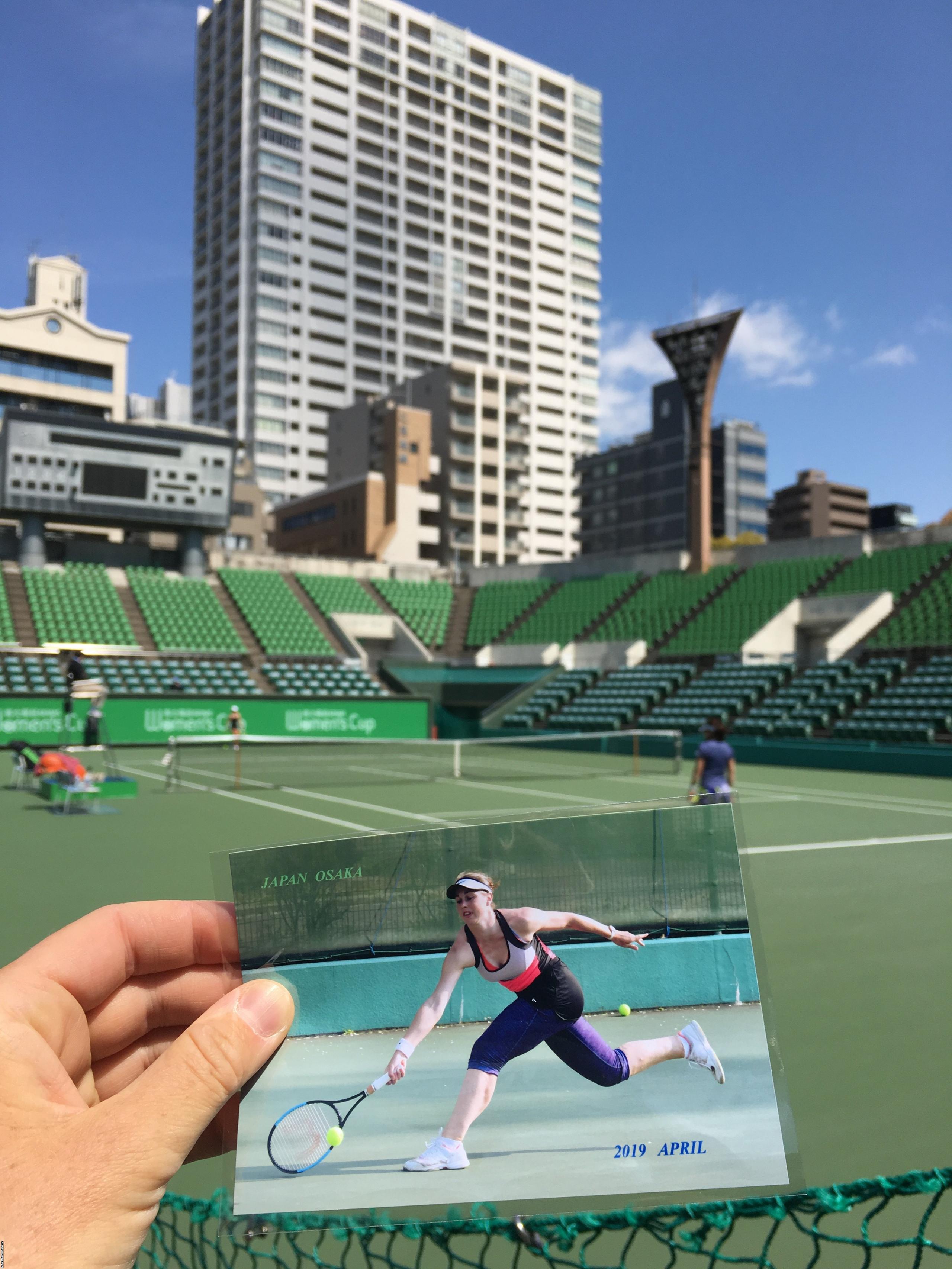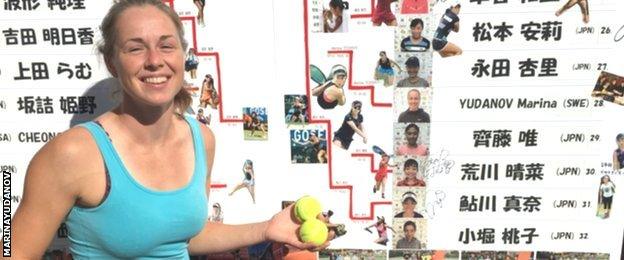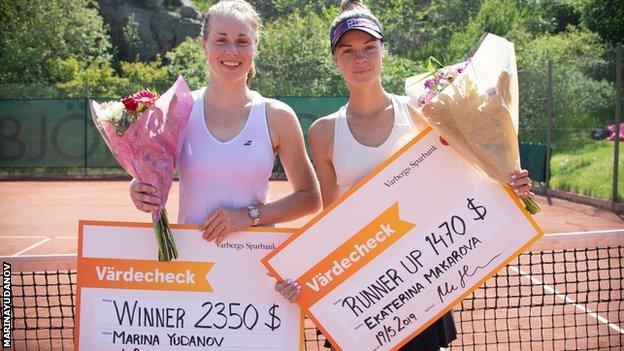Ranked 556th in a cut-throat world: Stories from tennis’ other side
- Published
- comments


Yudanov was national champion as a teenager but then turned her back on tennis
Marina Yudanov is the 556th best tennis player in the world. It is an unremarkable statistic that hides a remarkable story.
Back at the start of 2017, Yudanov, 29, was earning more than £30,000 a year as an engineer for Volvo in her native Sweden.
She was financially secure and settled, physically at least, in the buzzing second city of Gothenburg. But something was missing.
That was when she threw herself into the cut-throat world of a hustling lower-level tennis pro, in search of what might have been.
She funds this testing journey herself, giving everything on court and scrimping everywhere off it. Mammoth roadtrips over expensive plane tickets, cheap rental flats instead of hotels, sometimes sharing a twin room with the player she is facing the next day.
"Nothing of what I say is me whining or complaining, I really am not," Yudanov says.
"I am so grateful that I have the opportunity to do this but it is very difficult."
This is her story, a world away from the riches at the top of the game.

April 2019
Marina's diary:
"After losing in the last round of qualifying of an event in Osaka, Japan on the Monday, I used the rebookable option on my flight ticket - that I had paid extra for - to bring my return forward to Thursday instead of Sunday.
"On Tuesday, fate intervened. I got into the main draw as a lucky loser after someone pulled out injured. I then won against a girl ranked 300 places above me, and was due to play on Thursday - the day of my newly rebooked flight home.
"We were more than three hours away from Tokyo airport. What if we played a long match? I'd probably miss my flight. What if I won? I'd definitely miss my flight.
"A new ticket home would cost £550, which would hurt. So what did I do?

"The match was long, I lost in three sets, and then embarked on the most frantic trip of my life, leaving the club without showering, and going taxi-train-train-plane-plane until I arrived, more than 24 hours later, still dressed in tennis skirt and tank top in nearly sub-zero temperature and snow in Copenhagen. Then it was just a four-hour train up home.
"Had we played three minutes longer, I would have missed that plane and been in limbo in Tokyo airport."

How did it come to this?
Yudanov was once a teenage national champion, but a promising junior career flamed out as the pressures of academia, adolescence and sporting excellence bore down on her.
"I had been in the top juniors of my age, ranked 250 in the world at 16. But all those things were too much for me," she says.
"I had a teenage rebellion. I was hanging out with people who were not good for me, smoking, drinking and seeing older men. I thought, 'I hate this' and I walked away when I was 18."
For the next six years, Yudanov didn't pick up a racquet. But tennis crept back into her life, first as a practice partner for a friend, then as a tentative competitor in national tournaments. Then, aged 27, she handed in her notice.
"I had got myself somewhere with a good salary, but every single day I just wanted to get out on court and compete," she adds.
"I was getting up at 5am to go and do some kind of fitness before work and directly after work I would go and play tennis. It would fill my existence, chasing that feeling of competition that I missed.
"People at work were like 'oh that is great, follow your dream'. In the back of their head they thought: 'What the hell does this girl think she is doing, quitting her job to travel the world and lose money playing tennis?'"
And losing money, certainly at the start, is pretty much inevitable.
As an unranked player, as Yudanov was in the summer of 2017, you are a freelance bounty-hunter.
Starting a tennis career from scratch involves searching out tournaments with tiny pots of prize money and ranking points, which in turn give you a chance to enter the next tier of slightly larger events and slowly inch your way up the sport's greasy pole.
Yudanov began with 20,000 euros of family savings, approximately £18,000, to help her cover the costs of travel, accommodation and equipment as she started out.
Every decision in her career is an investment. A wager that she will collect enough points and prize money at an individual event to offset her costs.

Yudanov has to carefully consider which tournaments represent the best chance to win ranking points - and how much it will cost her
The major purchase she would make to help her career if she came into some unexpected money would be a campervan or motorhome to travel to tournaments in. It was a tactic that Germany's former top-75 player Dustin Brown used during his own days shuttling between backwater events., external
"There are a lot of mental sums in deciding the itinerary, for sure," Yudanov says.
"You check and see if the prize money and the points on offer and if your ranking is going to be good enough to get you in.
"If there are very few tournaments on a particular week globally, then you are going to have to travel further to find one because the fields will be stronger.
"If I go long haul, can I afford the investment of a plane ticket over there? Can I be there a few days in advance to cope with the jet lag or is that too expensive? Is there another player who might make the journey as well who I could share costs with and practice with?
"It is a gamble every time."

Date and location withheld to protect the guilty
"Some tournaments are mixed event venues with both men and women competing. With all these teenagers running around, a high-school vibe sort of develops. A lot of things are new, hormones are racing, some sexual tension, made more compelling because their parents are way back home...
"It normally works like this: if you are travelling alone, the tournament will put you to share a room with any other girl in the draw. I've shared rooms with tomorrow's rival multiple times. It isn't so bad; after all, they want to be well-prepared and well-rested just like you.
"It's a different story if your room-mate is out of the tournament. Her flight home might be days away, and so she is matchless at an all-inclusive resort hotel with fit foreign boys she'll probably never see again. Who can blame her for wanting to see them now?
"So - and yes, this has happened - if she just has to go out and see someone and comes back in the middle of the night, where does that leave you, your unbothered sleep and your early match next day? Life happens, even on tour, it is what it is."

Compared to the £45,000 that first-round losers walked away with at Wimbledon this year, the prize money Yudanov competes for is tiny.
She picked up a little less than £2,000 for winning a tournament in the Swedish resort town of Varberg in May.

Yudanov after winning a tournament in Varberg in her native Sweden
However, with careers only ever a losing streak or injury away from being squashed by cold, hard financial realities, the stakes are sky-high.
Matches are make-or-break micro-dramas played out in front of, perhaps, nobody.
"I remember playing in Tunisia there were some people and officials gathering and I thought they must really like the level of tennis," Yudanov says.
"After I realised that it was just we were the last match of the day on court and they were waiting for us to finish so that they could tidy up and pack away the court."
As well as her opponent, she often finds herself battling the shonky courts and one-eyed line calls.
"At one event in Egypt we were playing on clay courts and they were probably the worst maintained I have ever experienced. It was twist-your-ankle dangerous and we were still playing matches on them in 40C heat.
"One girl fell on the back of her head, fainted and they had to bring her in. It was rough.
"In the qualifying rounds you are definitely going to be calling your own lines and players definitely exploit it. There is so much at stake and in tennis some points are more important than others. If the ball is half in and half out, I am pretty sure that 80% of players are calling it out if it benefits them. Without a doubt.
"It can get really messy. There is a lot of debate going on, a lot of drama."
Without a coach, Yudanov leans on a backchannel scouting system to level up the playing field, spying on the opposition's social media and tapping up friends on the circuit to work out a tactic for the next day's match.
"The first step is to check your opponent's tournament history on the ITF website to see if they are on a hot streak or a losing streak," she says.
"Then you check the names they have played and text any you know to ask what her game is like. Or go on Instagram and check their technique and how they play.
"But, of course, you get texts back. The worse is when two girls are playing each other and both text you to ask about the other's game. You have to tell them, 'just so you know I am going to tell her a bit about you as well! Don't hate me for it!'"

December 2017
"I did well in Tunisia in September, so I came back, hungry to do even better. I had prepared properly but somehow didn't feel like myself at all on court: I couldn't recognise my own strokes, felt like I couldn't win a match. Nothing was working.
"We were playing in 10-15C. It was really chilly, but I didn't put much stock by it. I lost first in one tournament, then another, and as I was frantically practising for the third - feeling so powerless, like such a failure - I got so angry with it all that I threw my racquet into the fence.
"Then I picked it up kept playing and woah! I suddenly started playing so much better, getting length on my balls, my shots finally going somewhere!
"I looked at the racquet frame, saw that it had broken, and then it hit me that the broken frame had loosened the stringbed, and that's why I could hit the ball again. I needed to string my racquets looser in this lower temperature to get some power out of them.
"Of course, in September we'd had a good 30C. Some online research confirmed: polyester strings become stiff and lose their pop in the cold.
"So it had taken me two weeks, and I'd only figured this out because I threw my racquet so that it broke. Obviously, the pros and their teams know all of this. I didn't. And there are 50 of these things that you have to work out for yourself, on your own experience, on your own money."

Two years into her relaunched career, Yudanov is Sweden's sixth best player. She estimates that a combination of prize money and paid appearances for various clubs means her tennis now funds itself, even if she would need another jump in the rankings to be able to contribute to the household bills she racks up living with her boyfriend or parents.
There is a swift, illegal, way that some players at her level to supplement their income.
Ukraine's Helen Ploskina, who reached a ranking high of 698th in the world, was banned from tennis for life in May after being found guilty of match-fixing., external
"It is happening, but I haven't experienced it myself," says Yudanov.
"There is a lot of talk about it on social media. One person wrote at one point that they could place a bet on a lower-level tournament and would win more money than the player actually winning the tournament.
"There is a clear financial incentive to go into match fixing and be seduced by that money. If you are playing on these lower levels and not progressing, you are struggling financially. No-one is making money, unless perhaps they are fixing matches."
Yudanov turns 30 later this year. She knows her rewards from tennis won't be measured in millions of dollars. The bottom line for her is that initial family investment in a last grab at a disappearing dream.
She has stemmed the rapid losses she incurred as she found her way on the professional circuit, but is down to her last 5,000 euros, about £4,400.
"I don't have 10 years ahead of me to keep playing," she says.
"How much time do I have left to keep doing this and how long can I justify playing full time? Am I winning enough?
"My end goal is to make a living from competitive tennis. If I get there I want to play forever. Because tennis is where I show everything that I am."
